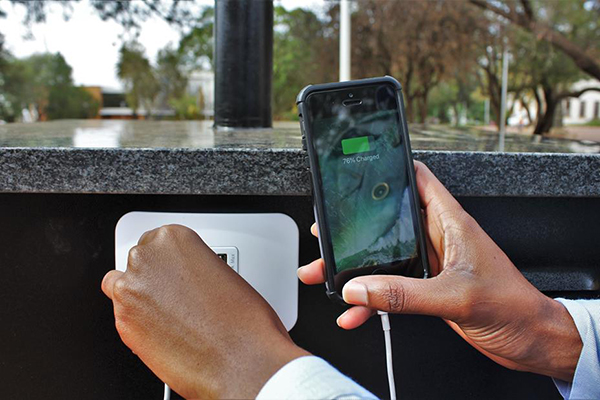Latest News Archive
Please select Category, Year, and then Month to display items
30 October 2018
|
Story Rulanzen Martin
|
Photo Peet van Aardt
 Some of the student writers who contributed to the anthology that tells their stories in Sesotho, isiXhosa, isiZulu, English and Afrikaans.
Some of the student writers who contributed to the anthology that tells their stories in Sesotho, isiXhosa, isiZulu, English and Afrikaans.
How do you transform the higher education curriculum? You involve the exact people the curriculum is intended for. The book, Initiative for Creative African Narratives (iCAN,) illustrates how decolonisation can be achieved through literature for students by students.
iCAN is an initiative by the Centre for Teaching and Learning (CTL) at the University of the Free State (UFS) to mentor students in creative and narrative writing. Under the mentorship of Dr Peet van Aardt, project coordinator, and Ace Moloi, author and UFS alumnus, iCAN Volume 1 was recently launched with 47 short stories written by UFS students.
“The project is a response from the centre for the ever-increasing need for decolonised curricula, steeped in the local cultural perspective of ubuntu,” said Dr Van Aardt.
“This book is an example for how decolonisation can be implemented,” said Prof Francois Stydrom, Senior Director of CTL. The overall aim of the iCAN project is to have the content that materialised from it to be included in the curriculum of first-year students at UFS in the near future.
Book provides multiple voices
Starting in May 2018, CTL presented a series of creative writing workshops on all three of the UFS campuses. “It’s a medium that allows a diverse range of students to express their views and develop their voices as writers,” said Prof Strydom.
It is a form of empowerment, to pass the baton to students to improve the UFS curriculum by writing and publishing their own stories, thereby contributing to larger bodies of knowledge through their lived experiences.
“I believe we as a university need to enable students so that they move away from just being users to becoming contributors to the curriculum,” Dr van Aardt concluded.
First solar charging station launched at UFS
2017-11-13

Students can now charge their phones at the first solar charging station
on the Bloemfontein Campus.
Photo: Moeketsi Mogotsi
On Friday 10 November 2017, the first solar charging station (600watts) was launched on the Bloemfontein Campus. This unit will be used by students to charge their phones and Ipads. It is the first of nine units to be installed on all three campuses; five on the Bloemfontein Campus and two each on the South and Qwaqwa Campuses.
Team effort results in great outcome
The project was a collaborative effort between the UFS and FCE Consulting Engineers. Coenie van der Merwe, Prototype Design Engineer, played a vital role in designing the charging unit. Anton Calitz, Electrical Engineer in University Estates’ Department of Facilities Management, says, “We are hoping that by the first quarter of 2018, we would have rolled out the remaining eight charging units.”
Project to enhance sustainability and address student needs
Prof Nicky Morgan, former Vice-Rector: Operations, says, “This should be a symbol of affordable opportunities that will both save the planet and enhance financial sustainability.” Nico van Rensburg, Senior Director of University Estates, says, “This renewable energy project is an innovative way of addressing student needs.”
However, students are advised not to charge other electrical appliances at the charging stations besides their phones and Ipads, as this may cause the charging unit to trip.
The UFS was recently awarded for its contribution towards sustainability. This was in recognition of its amazing initiative to install and operate photovoltaic (PV) and greywater systems on all three of its campuses.